Robert Frost
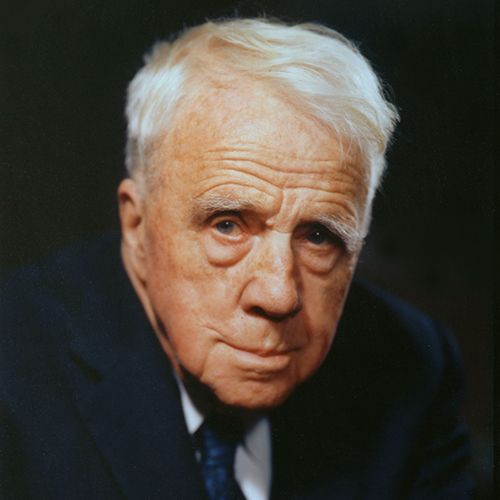
(1874-1963)

Who Was Robert Frost?
Robert Frost was an American poet and winner of four Pulitzer Prizes. Famous works include “Fire and Ice,” “Mending Wall,” “Birches,” “Out Out,” “Nothing Gold Can Stay” and “Home Burial.” His 1916 poem, "The Road Not Taken," is often read at graduation ceremonies across the United States. As a special guest at President John F. Kennedy ’s inauguration, Frost became a poetic force and the unofficial "poet laureate" of the United States.
Frost spent his first 40 years as an unknown. He exploded on the scene after returning from England at the beginning of World War I . He died of complications from prostate surgery on January 29, 1963.
Early Years
Frost was born on March 26, 1874, in San Francisco, California. He spent the first 11 years of his life there, until his journalist father, William Prescott Frost Jr., died of tuberculosis.
Following his father's passing, Frost moved with his mother and sister, Jeanie, to the town of Lawrence, Massachusetts. They moved in with his grandparents, and Frost attended Lawrence High School.
After high school, Frost attended Dartmouth College for several months, returning home to work a slew of unfulfilling jobs.
Beginning in 1897, Frost attended Harvard University but had to drop out after two years due to health concerns. He returned to Lawrence to join his wife.
In 1900, Frost moved with his wife and children to a farm in New Hampshire — property that Frost's grandfather had purchased for them—and they attempted to make a life on it for the next 12 years. Though it was a fruitful time for Frost's writing, it was a difficult period in his personal life and followed the deaths of two of his young children.
During that time, Frost and Elinor attempted several endeavors, including poultry farming, all of which were fairly unsuccessful.
Despite such challenges, it was during this time that Frost acclimated himself to rural life. In fact, he grew to depict it quite well, and began setting many of his poems in the countryside.
Frost met his future love and wife, Elinor White, when they were both attending Lawrence High School. She was his co-valedictorian when they graduated in 1892.
In 1894, Frost proposed to White, who was attending St. Lawrence University , but she turned him down because she first wanted to finish school. Frost then decided to leave on a trip to Virginia, and when he returned, he proposed again. By then, White had graduated from college, and she accepted. They married on December 19, 1895.
White died in 1938. Diagnosed with cancer in 1937 and having undergone surgery, she also had had a long history of heart trouble, to which she ultimately succumbed.
Frost and White had six children together. Their first child, Elliot, was born in 1896. Daughter Lesley was born in 1899.
Elliot died of cholera in 1900. After his death, Elinor gave birth to four more children: son Carol (1902), who would commit suicide in 1940; Irma (1903), who later developed mental illness; Marjorie (1905), who died in her late 20s after giving birth; and Elinor (1907), who died just weeks after she was born.
DOWNLOAD BIOGRAPHY'S ROBERT FROST FACT CARD
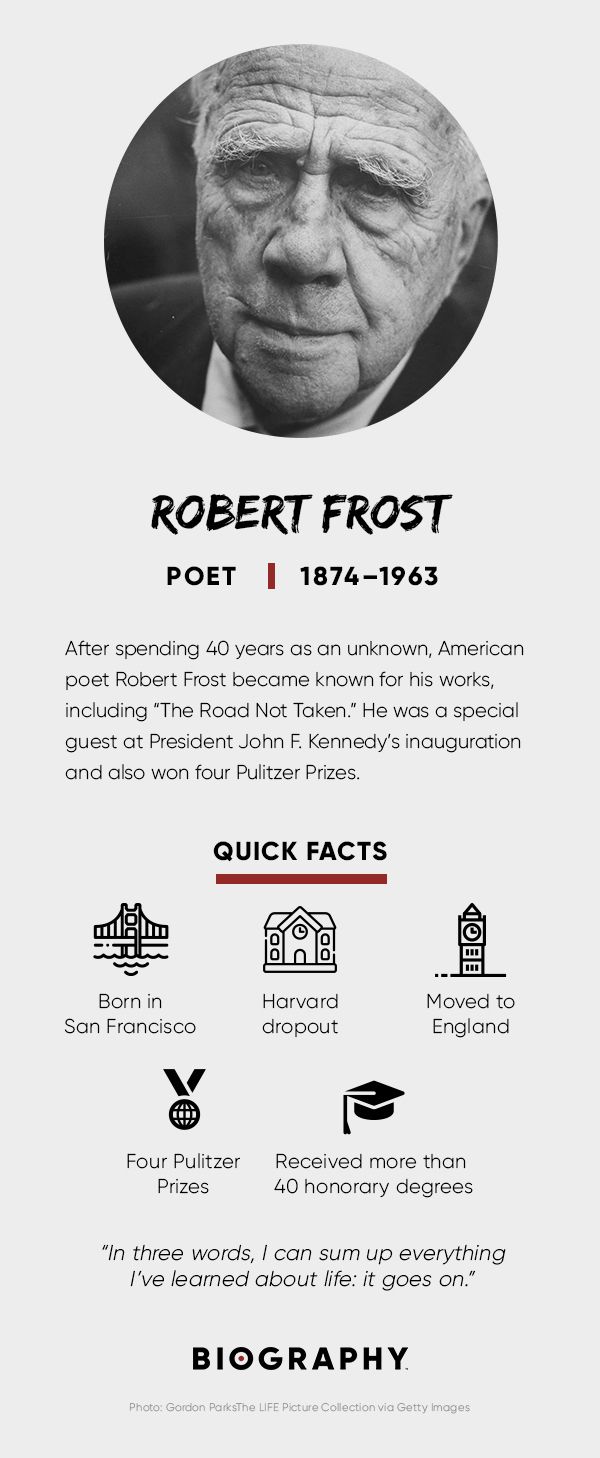
Early Poetry
In 1894, Frost had his first poem, "My Butterfly: an Elegy," published in The Independent , a weekly literary journal based in New York City .
Two poems, "The Tuft of Flowers" and "The Trial by Existence," were published in 1906. He could not find any publishers who were willing to underwrite his other poems.
In 1912, Frost and Elinor decided to sell the farm in New Hampshire and move the family to England, where they hoped there would be more publishers willing to take a chance on new poets.
Within just a few months, Frost, now 38, found a publisher who would print his first book of poems, A Boy’s Will , followed by North of Boston a year later.
It was at this time that Frost met fellow poets Ezra Pound and Edward Thomas, two men who would affect his life in significant ways. Pound and Thomas were the first to review his work in a favorable light, as well as provide significant encouragement. Frost credited Thomas's long walks over the English landscape as the inspiration for one of his most famous poems, "The Road Not Taken."
Apparently, Thomas's indecision and regret regarding what paths to take inspired Frost's work. The time Frost spent in England was one of the most significant periods in his life, but it was short-lived. Shortly after World War I broke out in August 1914, Frost and Elinor were forced to return to America.
Public Recognition for Frost’s Poetry
When Frost arrived back in America, his reputation had preceded him, and he was well-received by the literary world. His new publisher, Henry Holt, who would remain with him for the rest of his life, had purchased all of the copies of North of Boston . In 1916, he published Frost's Mountain Interval , a collection of other works that he created while in England, including a tribute to Thomas.
Journals such as the Atlantic Monthly , who had turned Frost down when he submitted work earlier, now came calling. Frost famously sent the Atlantic the same poems that they had rejected before his stay in England.
In 1915, Frost and Elinor settled down on a farm that they purchased in Franconia, New Hampshire. There, Frost began a long career as a teacher at several colleges, reciting poetry to eager crowds and writing all the while.
He taught at Dartmouth and the University of Michigan at various times, but his most significant association was with Amherst College , where he taught steadily during the period from 1916 until his wife’s death in 1938. The main library is now named in his honor.
For a period of more than 40 years beginning in 1921, Frost also spent almost every summer and fall at Middlebury College , teaching English on its campus in Ripton, Vermont.
In the late 1950s, Frost, along with Ernest Hemingway and T. S. Eliot , championed the release of his old acquaintance Ezra Pound, who was being held in a federal mental hospital for treason due to his involvement with fascists in Italy during World War II . Pound was released in 1958, after the indictments were dropped.
Famous Poems
Some of Frost’s most well-known poems include:
- “The Road Not Taken”
- “Fire and Ice”
- “Mending Wall”
- “Home Burial”
- “The Death of the Hired Man”
- “Stopping By Woods on a Snowy Evening”
- “Acquainted with the Night”
- “Nothing Gold Can Stay”
Pulitzer Prizes and Awards
During his lifetime, Frost received more than 40 honorary degrees.
In 1924, Frost was awarded his first of four Pulitzer Prizes, for his book New Hampshire . He would subsequently win Pulitzers for Collected Poems (1931), A Further Range (1937) and A Witness Tree (1943).
In 1960, Congress awarded Frost the Congressional Gold Medal.
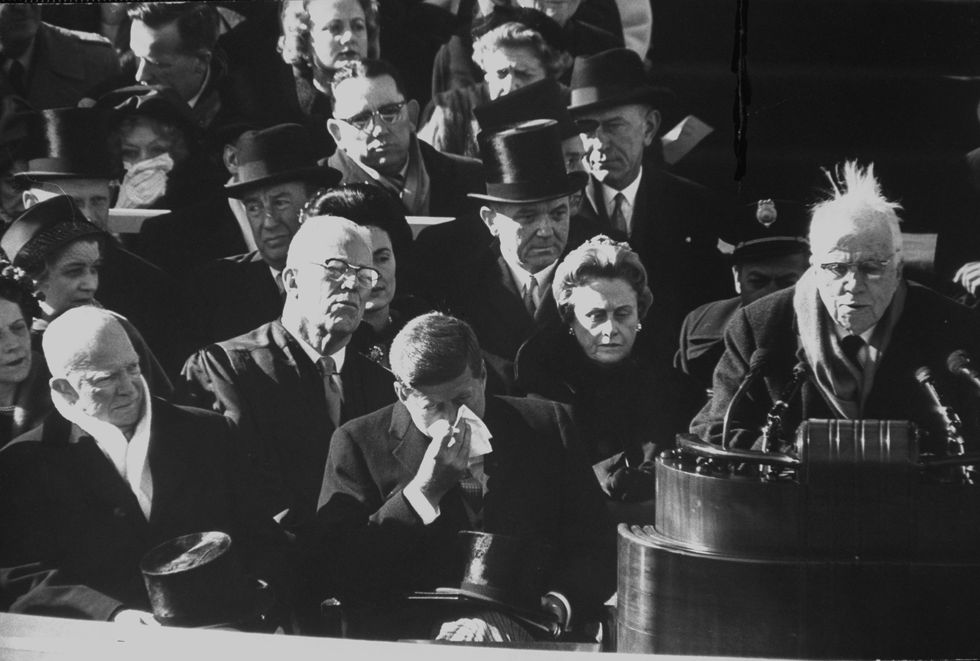
President John F. Kennedy’s Inauguration
At the age of 86, Frost was honored when asked to write and recite a poem for President John F. Kennedy's 1961 inauguration. His sight now failing, he was not able to see the words in the sunlight and substituted the reading of one of his poems, "The Gift Outright," which he had committed to memory.
Soviet Union Tour
In 1962, Frost visited the Soviet Union on a goodwill tour. However, when he accidentally misrepresented a statement made by Soviet Premier Nikita Khrushchev following their meeting, he unwittingly undid much of the good intended by his visit.
On January 29, 1963, Frost died from complications related to prostate surgery. He was survived by two of his daughters, Lesley and Irma. His ashes are interred in a family plot in Bennington, Vermont.
QUICK FACTS
- Name: Robert Lee Frost
- Birth Year: 1874
- Birth date: March 26, 1874
- Birth State: California
- Birth City: San Francisco
- Birth Country: United States
- Gender: Male
- Best Known For: Robert Frost was an American poet who depicted realistic New England life through language and situations familiar to the common man. He won four Pulitzer Prizes for his work and spoke at John F. Kennedy's 1961 inauguration.
- Fiction and Poetry
- Astrological Sign: Aries
- Harvard University
- Lawrence High School
- Dartmouth College
- Death Year: 1963
- Death date: January 29, 1963
- Death State: Massachusetts
- Death City: Boston
- Death Country: United States
We strive for accuracy and fairness.If you see something that doesn't look right, contact us !
CITATION INFORMATION
- Article Title: Robert Frost Biography
- Author: Biography.com Editors
- Website Name: The Biography.com website
- Url: https://www.biography.com/authors-writers/robert-frost
- Access Date:
- Publisher: A&E; Television Networks
- Last Updated: December 1, 2021
- Original Published Date: April 2, 2014
- The ear does it. The ear is the only true writer and the only true reader.
- I would have written of me on my stone: I had a lover's quarrel with the world.

Civil Rights Activists
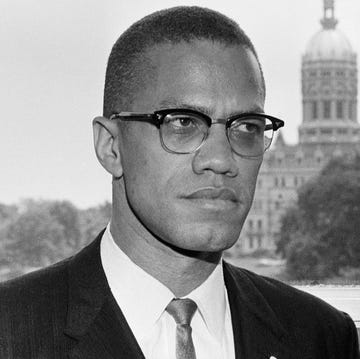
Ethel Kennedy
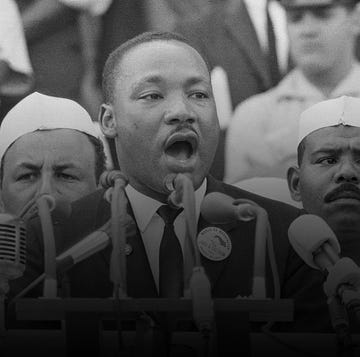
MLK Almost Didn’t Say “I Have a Dream”

Huey P. Newton
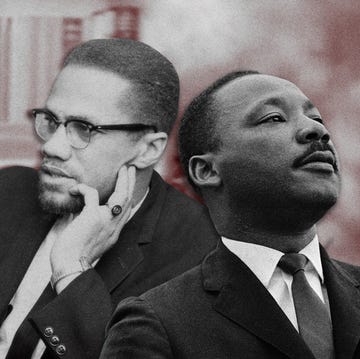
Martin Luther King Jr. Didn’t Criticize Malcolm X

5 Crowning Achievements of Maya Angelou

30 Civil Rights Leaders of the Past and Present
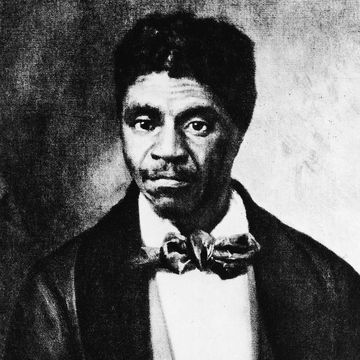
Benjamin Banneker
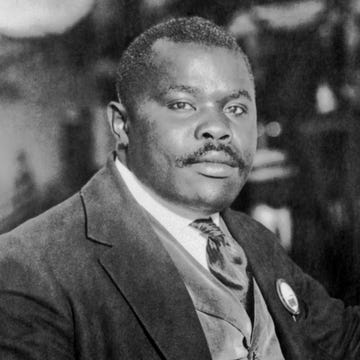
Marcus Garvey
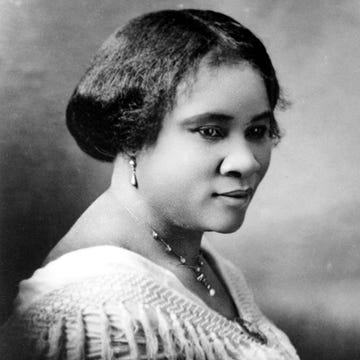
Madam C.J. Walker
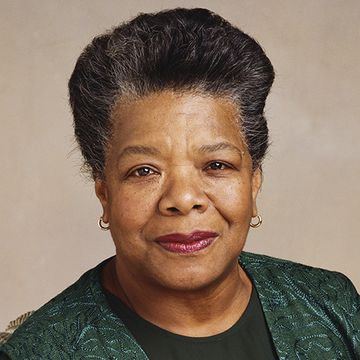
Maya Angelou
Poetry & Poets
Explore the beauty of poetry – discover the poet within
A Short Biography Of Robert Frost

Robert Frost is one of the most renowned and celebrated poets of the 20th century. Born in San Francisco in 1874, he was raised in a working-class family and started writing poetry while attending both high school and college in Massachusetts. He served as the Poet Laureate of the United States from 1958 to 1963, and is a four-time winner of the Pulitzer Prize for poetry. Frost’s works explore themes of nature, rural life and human relationships; they often use traditional forms such as sonnets and villanelles, as well as free-verse compositions.
The power of Frost’s verse lies in his use of colloquial language which speaks to the everyday experience of his readers. He was also highly influenced by New England writers including Edward Taylor, Emily Dickinson and Ralph Waldo Emerson, and incorporated many of their ideas and techniques into his own work. Frost’s classic works include ‘The Road Not Taken’, ‘Stopping by Woods on a Snowy Evening’ and ‘Nothing Gold Can Stay’.
Frost was an acclaimed poet in his lifetime and was described by friends and critics alike as a genius and an American master. In addition to his Pulitzer Prizes, he was awarded numerous honorary degrees and fellowships, and was posthumously awarded the Congressional Gold Medal in 1960. Frost’s life and work have been widely celebrated and have helped to define American poetry.

Frost continued publishing poems and books of poetry until his death in 1963. After being affected by health problems in the last five years of his life, he passed away in Boston at the age of 88. Robert Frost’s poetic legacy is significant, and he is remembered today as one of the most important American poets to ever live.
Early Life and Education
Robert Frost was born on March 26, 1874 in San Francisco, to Isabelle and William Prescott Frost, Jr. His father died when Frost was 11, and he was raised by his mother and stepfather who was a teacher.
At the age of 15, Frost started attending high school in Lawrence, Massachusetts. During his high school years, he published poems in the Lawrence High School newspaper. After graduating high school in 1892, he attended Dartmouth College for two months and later, Harvard for one semester.
In 1895, Frost returned to Lawrence and focused on writing poetry. He married Elinor Miriam White in 1895 and they had six children together. In 1897, Frost left Lawrence to teach at the New Hampshire State Normal School in Plymouth, New Hampshire where he experimented with his poetry and developed his own poetic style.
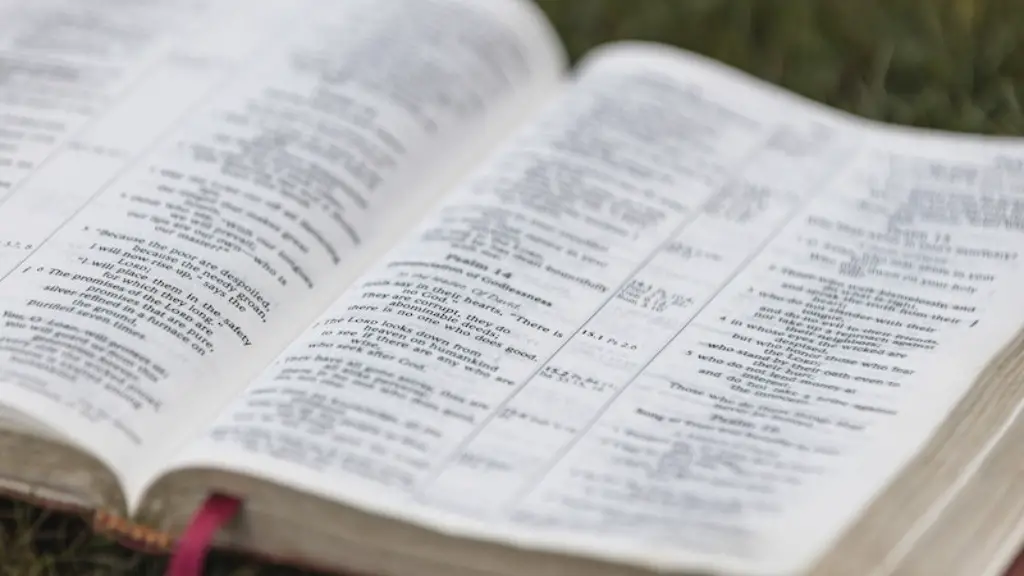
Frost was highly influenced by the writings of Emerson, Whitman and Edward Taylor. In 1912, he began submitting his poetry and soon after, several of his poems were published in nationally-renowned magazines.
Career and Major Works
In 1913, Frost and his family moved to England in search of a better literary atmosphere. While in England, he wrote and published his first book of poems, ‘A Boy’s Will’. This book was highly acclaimed in Britain but did not gain recognition in the U.S. until 1915. Later poetry books such as ‘North of Boston’ (1914) and ‘Mountain Interval’ (1916) shocked readers with their unconventional use of language and themes.
In 1920, Frost returned to the U.S., and soon after he began winning recognition, awards, lectureships and honorary degrees. Over the next few decades, he wrote and published numerous books of poetry, and also established himself as a literary lecturer. In 1938, he presented a lecture at the Library of Congress that received national attention.
In 1936, he was teaching at Amherst College, and soon after, he began teaching at Harvard and University of Michigan. During this period, he wrote ‘A Witness Tree’ (1942) and ‘Steeple Bush’ (1947). His poems from this period reflect his newfound faith in human kindness and optimism. Frost’s last book of poems, ‘In the Clearing’, was published in 1962.
Awards and Achievements
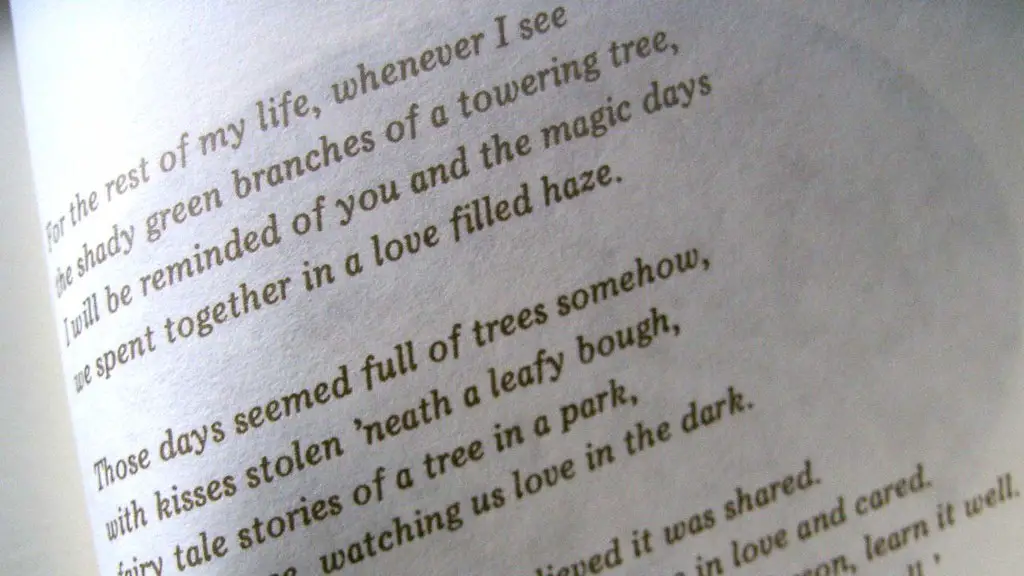
Frost has won numerous awards and honorary titles throughout his stellar career. He was awarded four Pulitzer Prizes for Poetry between 1924 and 1943, and four Special Citations from the Pulitzer Prize Board between 1944 and 1954. The U.S. government also awarded him with a Grant in Aid of Arts, Letters and Humanities in 1954. In 1958, he became the Poet Laureate of the United States and was also a Fellow of the American Academy of Arts and Letters.
In 1960, Frost was posthumously awarded the Congressional Gold Medal. He is the only person to receive this honor without first serving in a political or military capacity. Several colleges, universities and public buildings are named for him, including at Amherst College and the University of Michigan.
After his death in 1963, Frost’s legacy has only grown stronger. His poems are now required reading in many schools, and he continues to be one of the most studied and influential poets of all time. His work is part of the literary canon of the U.S. and beyond, and has been adapted for the stage, television and film.
Frost’s work is known for its accessible language and its subtle exploration of timeless themes. His poems make use of traditional poetic forms while speaking to the everyday experience of life. He had a deep appreciation for nature and the interconnectedness of life, and these ideas are omnipresent in his poetry. Robert Frost remains a symbol of poetic excellence and a source of inspiration for many writers.
Famous Quotes

Because of his lifelong appreciation of language, Frost left behind many famous quotations. Some of his most well-known quotes include: “The best way out is always through”, “In three words I can sum up everything I’ve learned about life: it goes on”, “A poet never takes notes; you never take notes in a love affair” and “A diplomat is a man who always remembers a woman’s birthday but never remembers her age”.
Influence on American Poetry
Frost was a leading figure in American poetry and was hugely influential to poets from many different generations. He had a lifelong love of language and believed that it should be accessible to everyone. His free-verse style of writing resonates with readers and is often cited as a major influence on modern poets. Frost’s work is a symbol of American poetry, and is required reading in many schools.
The widespread appreciation of Frost’s work can be attributed to his accessible language and his profound insights into human relationships. He is considered one of the most important American poets of all time, and his legacy continues to shape American poetry and literature.

Dannah Hannah is an established poet and author who loves to write about the beauty and power of poetry. She has published several collections of her own works, as well as articles and reviews on poets she admires. She holds a Bachelor of Arts in English, with a specialization in poetics, from the University of Toronto. Hannah was also a panelist for the 2017 Futurepoem book Poetry + Social Justice, which aimed to bring attention to activism through poetry. She lives in Toronto, Canada, where she continues to write and explore the depths of poetry and its influence on our lives.
Leave a Comment Cancel reply
(92) 336 3216666
Robert Frost
Robert Frost (Robert Lee Frost) was an American Poet. Before his works were published in America, they were published in England. Frost is known for his accurate description of country life and his grasp on the colloquial speech of America. Frost wrote about the rural life of New England in the early 20 th century. He used the settings of New England to analyze the philosophical and complex social themes.
Frost was admired and honored for his poetry. He is the only poet who received four Pulitzer Prizes in Poetry. He turned out to be one of the rare literary figures of America who was almost an artistic institution. In 1960, he was honored with the Congressional Gold Medal for his poetry. He was named as poet laureate of Vermont on 22 nd July 1961.
A Short Biography of Robert Frost
Robert Frost was born on 26 th August 1874 to William Prescott, Jr. and Isabelle Moodie Frost. His father, William, was a journalist and was ambitious to make his career in California. He has only one sister Jeanie Frost. In 1885, his father died, and his mother shifted to Lawrence, Massachusetts, with her two children. The children were taken by the paternal grandparents of Robert and grew up in Lawrence, whereas his mother started teaching at different schools in Massachusetts and New Hampshire. In 1892, Robert graduated from high school. He was a top student in the class and shared his valediction honors with his beloved Elinor White.
Both Elinor and Robert shared interest in poetry; however, they were separated as Robert continued his education at Dartmouth College, and Elinor went to St. Lawrence University. The poetic career Robert had started in high school was continued by him. He published his first poem, My Butterfly: An Elegy” in 1894 in a weekly journal, The Independent. Frost left Dartmouth College before the completion of his first year because of the tiring academic routine.
In 1985, he married Elinor. However, life was difficult, and Robert started teaching and farming to support his family. His fields of career did not meet any notable success. In the following twelve years, they had six children. Two of the children died at an early age. In 1897, Robert resumed his education at Harvard University and left the university after two years. From1900 to 1909, the family started poultry on a farm in New Hampshire; Frost also started teaching at the Pinkerton Academy in Derry. Frost turned into an ambitious botanist and attained his poetic identity of a rural sage of New England during these years. He was writing poetry during the time, but the publishing opening shows that he did not have much interest in it.
Frost was struggling against the discouragement by 1911. For him, poetry was regarded as a game of a young person. Whereas Frost, who was almost 40 years old, could not publish a book and only had published a few handfuls of poems in magazines. In 1911, Frost got ownership of the Derry farm. He made a sudden decision to sell the farm and started a new life in London. To him, the publishers in London were more approachable to new talent than in America. In 1912, Frost, along with his family, moved to England. Frost also took his poems with him that he had written in America but did not publish it. Indeed the publishers of England proved receptive to an innovative verse of Robert Frost. Frost n with his own efforts and help of Ezra pound published his book A Boy’s Will in 1913. His poems “The Tuft of Flowers,” “Mowing,” and “Storm Fear” from the first book were the standard pieces.
In 1914, he published his second collection North of Boston. The collection contained the major and most popular poems of Robert Frost. These poems include “The Death of the Hired Man,” “After Apple-Picking,” “Mending Wall,” and “Home Burial.” In 1914, Anne Lowell, the Boston poet, traveled to England and encountered Frost’s work in the bookstore. She took the books with her to America and launched a campaign to publish it in America. In the meantime, she also started writing a complimentary review of North of Boston.
Frost had achieved great fame without his knowledge. In 1915, Frost returned to America because of World War I. Till that time, the review of Amy Lowell was already published, and everyone was aware of the unusual qualities of Robert Frost. His book North of Boston had been published by Henry Holt Publishers in 1914. It was the best-seller, and when Frost was moving to America, it had already started publishing the American edition of A Boy’s Will. Frost was instantly approached by various magazines to publish his poems.
In 1915, at Franconia, New Hampshire, Frost bought a little farm. However, he was unable to support his family with the income of poetry and farm. Thus, he started lecturing part-time at Amherst College. From 1916 to 1938, he taught at the University of Michigan. In 1916, he published a new collection of poems, Mountain Interval. The collection continued to be as successful and the previous one. In 1923, he published New Hampshire. This collection received a Pulitzer Prize for poetry.
His further collection was published in the succeeding years. He published Collected Poem in 1930, Further Range in 1936, and A Witness Tree in 1942. He also published volumes of poetry that includes West-Running Brook in 1928, In Clearing in 1962, and Steeple Blush in 1947. From 1939 to 1943, he served as the Poet-in-residence at Harvard; from 1943 to 1949 at Dartmouth; and from 1949 to 63 at Amherst College. He gathered awards and honors from every year in his last years. He also served as the poetry consultant to the Library of Congress from 1958 to 1959.
In 1962, on a goodwill tour, Frost visited the Soviet Union. However, he, by mistake, altered the statement by Soviet Premier Nikita Khrushchev after the meeting. The good intended by the visit was unwittingly undone.
On 29 th January 1963, frost faced complications from his prostate surgery and died. He left two daughters, Irma and Lesley. His remains are buried in Bennington, Vermont, in a family plot.
Robert Frost’s Literary Style
A regional poet.
Robert Frost was living in the region of New England, almost in New Hampshire. He considered it to be one of the two best states in the United States of America; the other was Vermont. He was a poet in his region. He did not include the region of all of America in his poetic scope. However, he also did not attempt to bring regional unity to his characters and also create a Utopian world for them. According to John Lynen, “Frost is the best known to the public as the poet of New England. Like Faulkner, he stands forth as both the interpreter and the representative of his regional culture.”
The setting of New England offered him stories, characters, attitudes that he needed. He loved the tradition of New England and sought strength from it. His works fall in the pastoral literary tradition. His characters, subjects, and events belong to rural New England. He focuses on the ordinary setting and events of rural areas.
Symbolism in Robert Frost’s Poetry
Symbolism is an indirect and veiled mode of communication. Along with the surface meaning, a literary piece also has a deeper meaning, which can only be understood when one reads the poem/literary work through close examination. The poems of Robert Frost have symbolic meaning.
For example, the poem “Mending Wall” apparently suggests that good neighbors are made by good friends. However, the poem symbolically deals with one of the significant problems. It put forwards the question of whether to make the natural boundaries strong to protect ourselves or to remove them as they limit our interaction with other people.
Similarly, the poem “Stopping by Woods” symbolically suggests the struggle of every individual between their social duties towards others with the stresses of our practical life and the moving longing to escape into nature and relax. Moreover, darks woods in the poem that is covered with the snow, and the speaker is greatly attracted to it, symbolizes death. However, the speaker turns down the call of nature (wood) and decides on fulfilling his social obligations. The speaker says:
“The woods are lovely, dark and deep
But I have promises to keep,
And miles to go before I sleep,
And miles to go before I sleep.”
The poem “Stopping by Woods on a snowy evening” has a new sort of symbolism, unlike the outdated traditional pastoral symbolism. The subtly and indirect nature of Frost’s symbolism in the poem is due to its fondness for inference than obvious statements. It is due to this subtle quality that readers admire Frost’s poetry. Another unique quality in the reading of the poems of Frost is that our surface understanding of the poem does not coincide with deeper meaning.
Though the poems or subject matters, Frost’s poetry is complicated. However, clarity in verse veiled the complications and made the poem comprehensible. Even if the poems had nothing but surface meaning, Frost would be admired for his clarity of verse.
Seriousness and Spontaneity in Frost’s Poetry
The whole life of Robert Frost was dedicated to his poetry, which shows his seriousness for his art. But in the initial life, he did not pay much attention to his poetic talent or analyze the source of his poetic gift. This turned the poetry of Frost having unforced, simple, and lyric charm. It appears to be written effortlessly and naturally, just as breathing.
The verse of Robert Frost d stately, formed, and easily anticipated. The technique he employed is simple. He carefully handles the language and rhythm that his most sophisticated poems have spontaneity. Therefore, his ideas seem to be suddenly discovered, not conceived earlier.

Isolation and Loneliness in Robert Frost’s Poetry
One of the important themes of the poetry of Robert Brown is the isolation of man in the universe and his feeling of alienation from nature. The Majority of his poems deal with the feeling of loneliness and sense of isolation. These themes are also influenced by Frost’s personal experiences. Frost’s sister Jeanie has been mentally ill for a long period due to which she became completely alienated from the world. Jeanie was not able to cope with the stiffness and cruelty of existence. For her, the reality of love, birth, and death was conflicting. The ideal world of Jeanie never reconciled with her real world.
In the poem “Home Burial,” the plight of the husband is similar to the plight of Frost in being powerless to deter her sister from the view of the world. The woman in the poem is unable to accept the reality of the situation, just like Jeanie. The woman is unable to reconcile herself to the death of her child and becomes totally alienated from the world.
Similarly, in the poem “An Old Man’s Winter Night” is about an old man roaming alone in the empty house on a winter night and then goes to the store and sleep beside it. The poem efficiently portrays the loneliness of old age and shows deep hostility of life counter to death.
“One Aged Man—-One Man—Can’t Keep A House,
A Farm, A Countryside, Or If He Can,
It’s Thus He Does It Of A Winter Night.”
The Portrayal of Characters and Psychoanalysis
Frost’s poems also depict the characters with a psychoanalytical approach. The psychoanalytical approach shows the features of modernism in Frost’s poetry. In these poems, Frost explores the unconscious mind of his characters, although Frost does not seem to be directly influenced by Sigmund Freud. His poetry also focuses on abnormal psychology, dealing with morbid and unconventional behavior of humans. In these poems, the characters are lonely and neurotic. For example, in the poem Home Burial , there is an over-wrought mother who is outrageous in the grief of the death of her child.
Similarly, in “The Death of Hired Man,” the decaying Silas is adhering through carelessness and failure to his need for self-respect. The characters of Robert Frost are full of blood and flesh; he enters into their mind with intense awareness and brings into reality their movements, actions, and speeches with psychoanalytical power.
Narrative and Dramatic Quality of Frost’s poetry
Robert Frost’s poetry is essentially dramatic, no matter what the theme is. He dramatizes his poetry for his readers by creating full scenes of situations and a realistic atmosphere. The dramatic quality is at the peak in the poem at denouement when the fact of the world in the poem attains its metaphysical significance.
For example, in the poem “Home Burial” and “The Death of Hired Man” characters, scenes, and dialogues are shown with full narrative skills like a stage drama.
Fancy and Fact in Frost’s Poetry
The poetry of Robert Frost is beautifully blended of fancy and fact. He inculcates everything in his observation. In the poem “Stopping by Woods,” Frost blends the fancy and facts through the feeling of enjoying the scene of beautiful wood and trying to escape from reality. The speaker is captivated in a lovely scene, but at the same time, he realizes his social obligations of the real and practical life.
Conversational and colloquial Style of Robert Frost
Robert Frost mastered the colloquial and conversational style. He uses sober, quire, and bewitching sort of words. His dialogues are homely, such as in Poem “Home Burial” and “Death of The Hired Man.” His poetry has actual speech rhythm and employed it with mastery. One of his distinguishing features includes the movement of blank verse. The diction he uses is also simple and colloquial. Just like Wordsworth, he employed the language really used by the common man.
Poet of Nature
One of the dominant subjects of Frost’s poetry is Nature; however, he is not nature-poet like that of Thomas Hardy and Wordsworth. His poetry focuses on a man in nature, whereas the poetry of Wordsworth deals with the prospect of the natural world. He perceives no infusing essence in the natural objective and hardhearted. For Frost, nature provides comfort as well as a threat.
Philosophy, Moral Didacticism, and Aphorism
The wisdom that develops by tolerance, understanding, and observation is preferred by Frost. He is a philosophical poet, and his philosophical value lies in the incentive of intelligence which assists human actions in everyday life. The main characteristics of Frost’s poetry are: it is philosophical, didactic, and aphoristic. The aphoristic verses in the poem provide philosophical and didactic quality. The Following are the examples of his aphoristic lines from different poems.
“A Home is a place where, when you have to go there, they have to take you in” from the poem “Death of Hired Man.”
“Something there is that doesn’t love a wall” From the poem “Mending Wall.”
“Earth’s right place for love
I do not know where it’s likely to go better ” From the poem “Birches.”
“But I have promises to keep,
And miles to go before I sleep” from the poem “Stopping by Wood.”
Though the poems of Frost have a moral purpose, however, the moral lesson is given through either an argument moving the lyric or in a dramatic situation. The moral lesson is not explicit and obvious. Similarly, he deals with the notions of life, birth, truth, and death to make his poem philosophical.
Lyrical Quality
In his poetry, Frost employs the oldest way to make a new and distinctive lyrical form of poetry. Musicality is an essential feature of a lyrical poem, and musicality in the verses is achieved by rhyme, meter, and traditional patterns of stanzas. Frost’s main reputation is based on the lyrical quality of his poetry. For example, in the poem “Stopping by Wood” and “The Road Not Taken” is full of lyricism. In his poetry, Frost not only renews the subject of lyricism in poetry but also brought originality and astonishing sophistication to it. Frost focuses much on the tune and sound of his poem.
Fusion or Integration in Frost’s Poetry
In Frost’s poetry, heterogeneous ideas and elements are fused together in a single independent unit. The main problem is to achieve fusion and integration. Once the integration is achieved, wonder, mystery, and magic are observed in the poetry. According to Frost, a variety of poetry lies not in its uniqueness of form but in the uniqueness of its subject matter. The two ideas fused together in a poem may be difficult to separate from each other. In Frost, poetry, two different subjects are happily united, not forcefully.
Metaphysical Elements in Frost’s Poetry
Just Emerson and Emily Dickenson, Frost is also a metaphysical poet. His metaphysical quality permits him to see beyond the ordinary. Throughout the poems of Frost, like other great metaphysical poems, there is an increased tension created between the simple feet and the mystery revolving around it. The conflict is resolved at the end of the poem with a moral lesson.
The Irony in Robert Frost’s Poetry
In “Two Ways of Looking at Robert Frost, Randel Jarrell writes: “At its best, Frost’s irony is the sharpest of poetic weapons; at its worst, it is the forgivable pun of a wise old duffer.”
There are two personalities of Robert Frost. The one that everyone knows and the one nobody really knows it or talks about it. The personality of Frost that everyone knows is the one who writes poetry with good puns, and these puns are easily understood by the common readers. For academic writers, the easy side is very attractive, and it is this side that the other personality of the poet is neglected. Similarly, the poetry of Frost has two sides: simple and ironic. The irony is hardly understood by anyone.
Works Of Robert Frost
- The Road Not Taken
- Mending Wall
- National Poetry Month
- Materials for Teachers
- Literary Seminars
- American Poets Magazine
Main navigation
- Academy of American Poets
User account menu

Search more than 3,000 biographies of contemporary and classic poets.
Page submenu block
- literary seminars
- materials for teachers
- poetry near you
Robert Frost
Robert Frost was born on March 26, 1874, in San Francisco, where his father, William Prescott Frost, Jr., and his mother, Isabelle Moodie, had moved from Pennsylvania shortly after marrying. After the death of his father from tuberculosis when Frost was eleven years old, he moved with his mother and sister, Jeanie, who was two years younger, to Lawrence, Massachusetts. He became interested in reading and writing poetry during his high school years in Lawrence, enrolled at Dartmouth College in Hanover, New Hampshire in 1892 and, later, at Harvard University, though he never earned a formal degree.
Frost drifted through a string of occupations after leaving school, working as a teacher, cobbler, and editor of the Lawrence Sentinel . His first published poem, “My Butterfly,” appeared on November 8, 1894 in the New York newspaper The Independent .
In 1895, Frost married Elinor Miriam White, with whom he’d shared valedictorian honors in high school, and who was a major inspiration for his poetry until her death in 1938. The couple moved to England in 1912, after they tried and failed at farming in New Hampshire. It was abroad where Frost met and was influenced by such contemporary British poets as Edward Thomas , Rupert Brooke , and Robert Graves . While in England, Frost also established a friendship with the poet Ezra Pound , who helped to promote and publish his work.
By the time Frost returned to the United States in 1915, he had published two full-length collections, A Boy’s Will (Henry Holt and Company, 1913) and North of Boston (Henry Holt and Company, 1914), thereby establishing his reputation. By the 1920s, he was the most celebrated poets in America, and with each new book—including New Hampshire (Henry Holt and Company, 1923), A Further Range (Henry Holt and Company, 1936), Steeple Bush (Henry Holt and Company, 1947), and In the Clearing (Holt Rinehart & Winston, 1962)—his fame and honors, including four Pulitzer Prizes, increased. Frost served as a consultant in poetry to the Library of Congress from 1958–59. In 1962, he was presented the Congressional Gold Medal.
Though Frost’s work is principally associated with the life and landscape of New England—and, though he was a poet of traditional verse forms and metrics who remained steadfastly aloof from the poetic movements and fashions of his time—Frost is anything but merely a regional poet. The author of searching, and often dark, meditations on universal themes, he is a quintessentially modern poet in his adherence to language as it is actually spoken, in the psychological complexity of his portraits, and in the degree to which his work is infused with layers of ambiguity and irony.
In a 1970 review of The Poetry of Robert Frost , the poet Daniel Hoffman describes Frost’s early work as “the Puritan ethic turned astonishingly lyrical and enabled to say out loud the sources of its own delight in the world,” and comments on Frost’s career as the “American Bard”: “He became a national celebrity, our nearly official poet laureate, and a great performer in the tradition of that earlier master of the literary vernacular, Mark Twain.”
President John F. Kennedy, at whose inauguration Frost delivered a poem, said of the poet, “He has bequeathed his nation a body of imperishable verse from which Americans will forever gain joy and understanding.” And famously, “He saw poetry as the means of saving power from itself. When power leads man towards arrogance, poetry reminds him of his limitations. When power narrows the areas of man’s concern, poetry reminds him of the richness and diversity of his existence. When power corrupts, poetry cleanses.”
Robert Frost lived and taught for many years in Massachusetts and Vermont, and died in Boston on January 29, 1963.
Related Poets
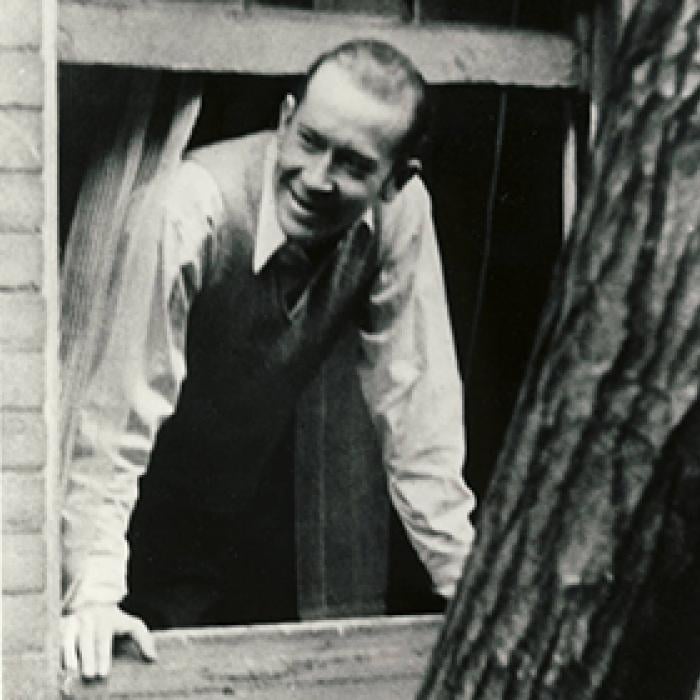
E. E. Cummings
Edward Estlin Cummings is known for his radical experimentation with form, punctuation, spelling, and syntax; he abandoned traditional techniques and structures to create a new, highly idiosyncratic means of poetic expression.
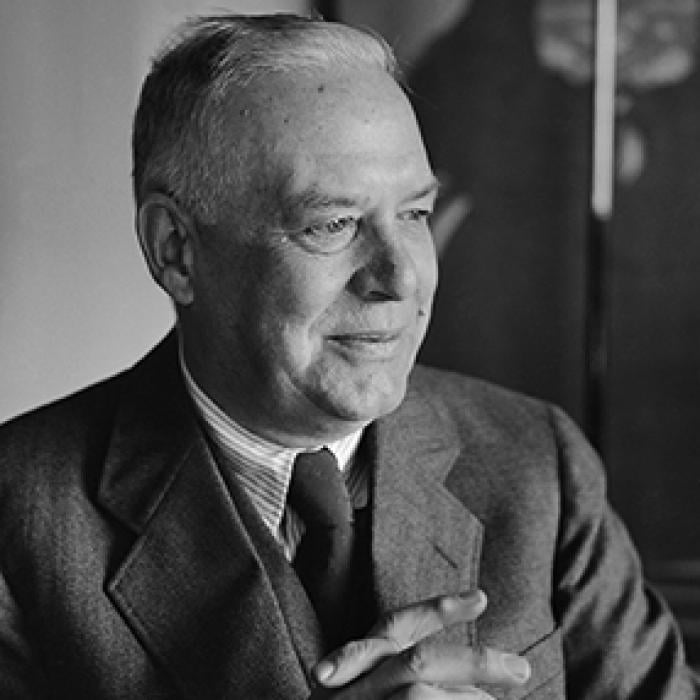
Wallace Stevens
Wallace Stevens was born in Reading, Pennsylvania, on October 2, 1879. He attended Harvard University as an undergraduate from 1897 to 1900.
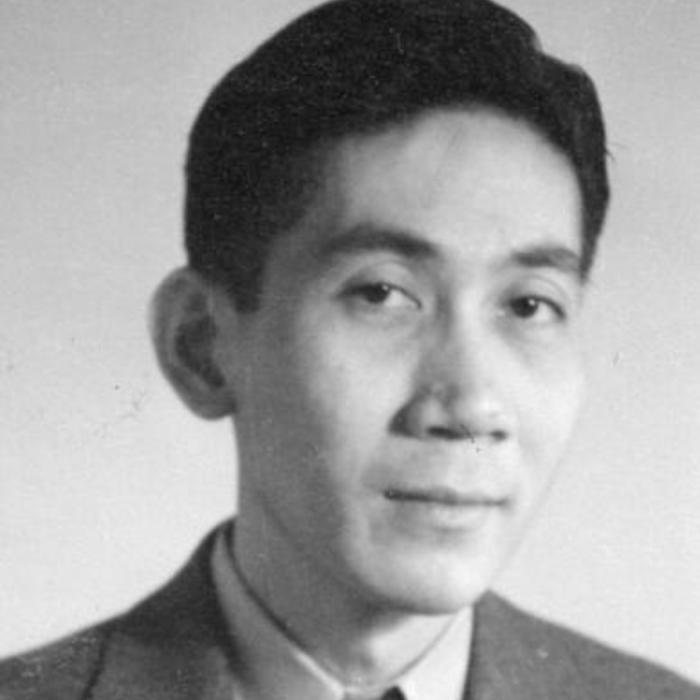
José Garcia Villa
José Garcia Villa was born in Manila in 1908. He published several poetry collections in the Philippines and in the United States, including Have Come, Am Here (Viking Press, 1942), which was a finalist for the 1943 Pulitzer Prize. He died in New York City in 1997.
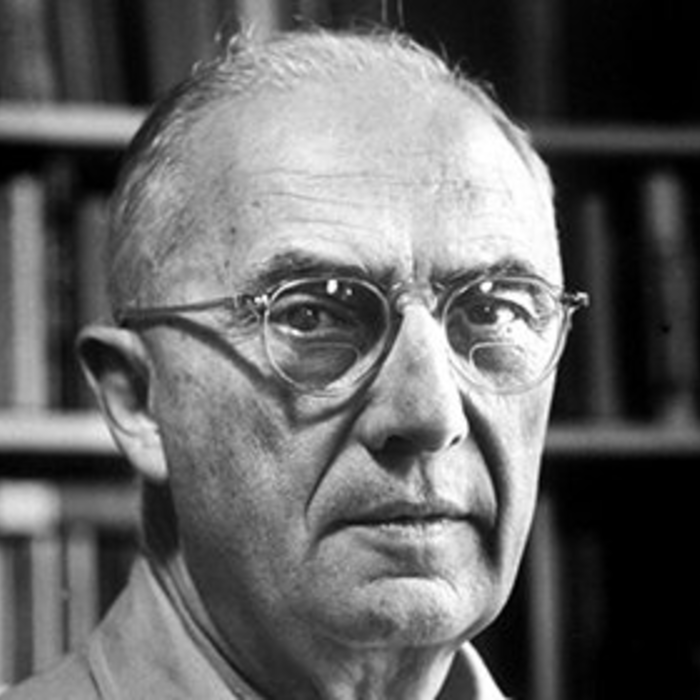
William Carlos Williams
Poet, novelist, essayist, and playwright William Carlos Williams is often said to have been one of the principal poets of the Imagist movement.
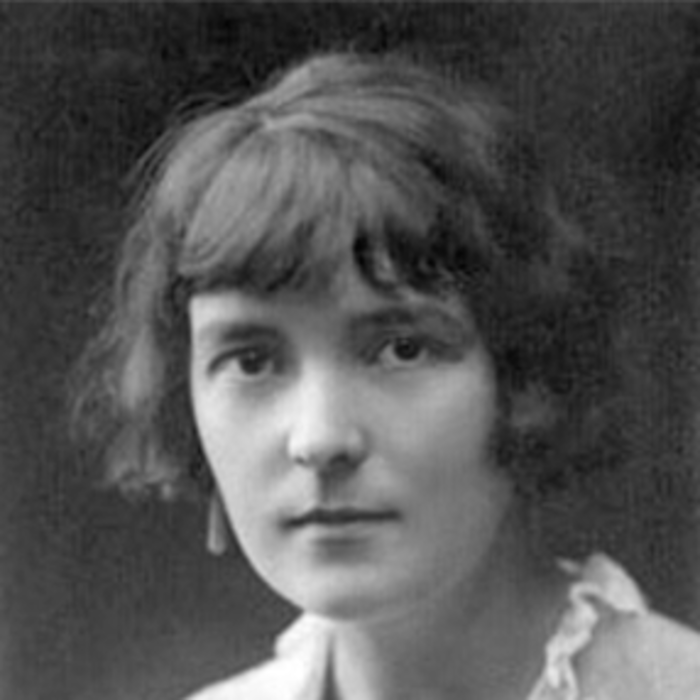
Katherine Mansfield
Katherine Mansfield Beauchamp was a New Zealander poet, essayist, short story writer, and journalist from the Modernist movement.
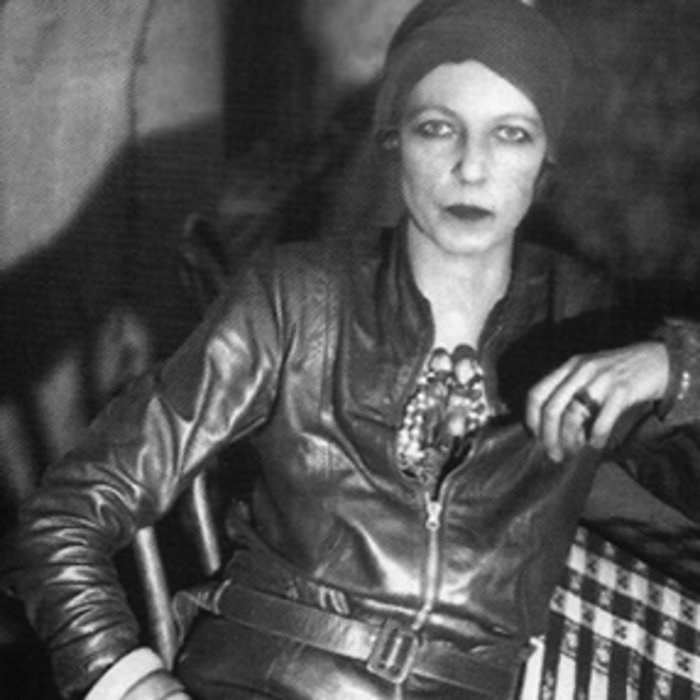
Nancy Cunard
Nancy Clara Cunard, born on March 10, 1896, in London, was an English poet, editor, and political activist.
Newsletter Sign Up
- Academy of American Poets Newsletter
- Academy of American Poets Educator Newsletter
- Teach This Poem

IMAGES
VIDEO
COMMENTS
Robert Frost (born March 26, 1874, San Francisco, California, U.S.—died January 29, 1963, Boston, Massachusetts) was an American poet who was much admired for his depictions of the rural life of New England, his command of American colloquial speech, and his realistic verse portraying ordinary people in everyday situations. He was the most highly honored American poet of the 20th century ...
Robert Frost was an American poet who depicted realistic New England life through language and situations familiar to the common man. He won four Pulitzer Prizes for his work and spoke at John F ...
Robert Lee Frost (March 26, 1874 - January 29, 1963) was an American poet. Known for his realistic depictions of rural life and his command of American colloquial speech, [2] Frost frequently wrote about settings from rural life in New England in the early 20th century, using them to examine complex social and philosophical themes. [3]Frequently honored during his lifetime, Frost is the only ...
January 22, 2024 by Ted Hannah. Robert Frost is one of the most renowned and celebrated poets of the 20th century. Born in San Francisco in 1874, he was raised in a working-class family and started writing poetry while attending both high school and college in Massachusetts. He served as the Poet Laureate of the United States from 1958 to 1963 ...
Learn about the life and poetry of Robert Frost, an American poet who wrote about rural life and won four Pulitzer Prizes. Explore his literary style, regional influences, and famous poems such as "The Road Not Taken".
Learn about the life and works of Robert Frost, an American poet who wrote realistic poems about rural life and won four Pulitzer Prizes. Find out his birth and death dates, family background, education, travels, and legacy.
Robert Frost lived and taught for many years in Massachusetts and Vermont, and died in Boston on January 29, 1963. Robert Frost - One of the most celebrated figures in American poetry, Robert Frost was the author of numerous poetry collections, including New Hampshire (Henry Holt and Company, 1923). Born in San Francisco in 1874, he lived and ...
Harvard University. Aries Poets. Male Poets. Childhood & Early Life. Robert Lee Frost was born on March 26, 1874, in San Francisco, California, US, to William Prescott Frost, Jr. and his wife, Isabelle Moodie. His father, a journalist, was the descendant of an English immigrant, while his mother was a Scottish immigrant.
Robert Frost. Robert Frost was born in San Francisco, but his family moved to Lawrence, Massachusetts, in 1884 following his father's death. The move was actually a return, for Frost's ancestors were originally New Englanders, and Frost became famous for his poetry's engagement with New England locales, identities, and themes.
Learn about the life and works of Robert Frost, the American poet who won four Pulitzer Prizes and wrote some of his most memorable poems on a farm in New Hampshire. Explore his books, letters, prose, interviews, and biographies on this web page.